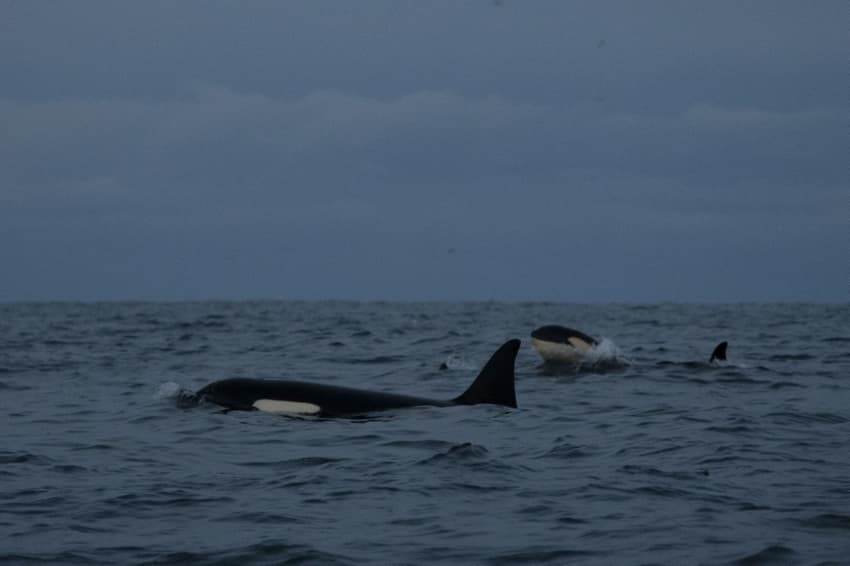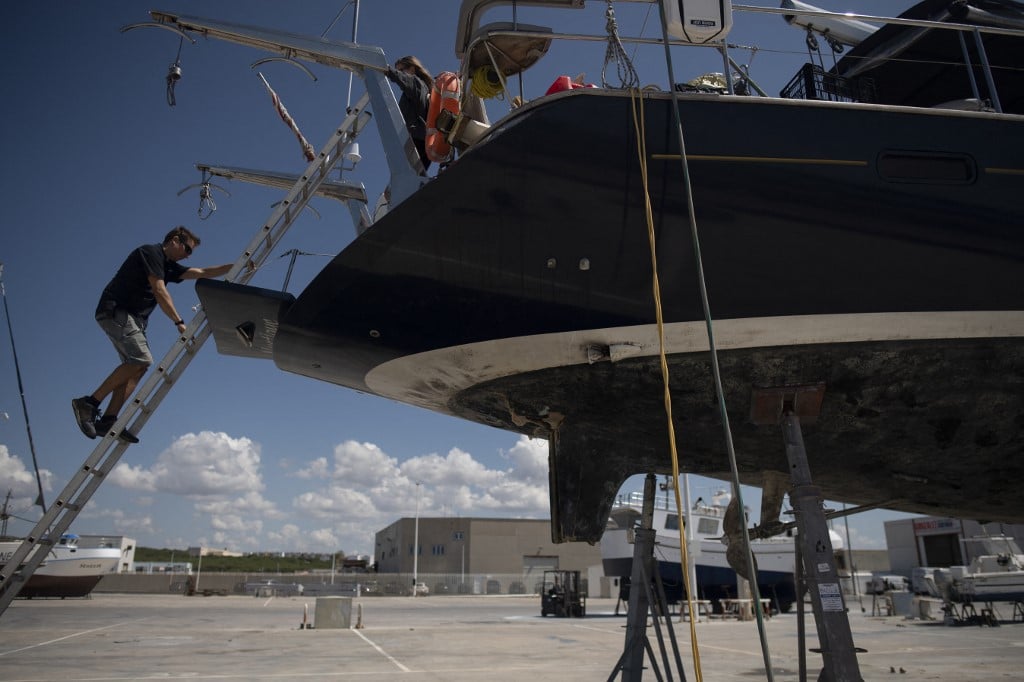Scientists puzzled by killer whale boat attacks off Spain

Groups of killer whales have rammed hundreds of small boats off the coast of Spain in recent years in "terrifying" behaviour that has baffled scientists.
"They directly attacked the rudder, not swimming around the boat, not playing with anything," Friedrich Sommer told AFP as he recalled how his sailboat Muffet was damaged earlier this year by "three or four" killer whales.
"They rammed at full speed against the rudder," the German sailor told AFP as he waited for his vessel to be fixed in Barbate, a coastal town in Spain's southern Cádiz province.
Rafael Pecci, manager of the shipyard where it is being repaired, is already busy repairing another sailboat that was attacked by killer whales, also called orcas.
"It has completely lost the rudder," he said, pointing to the damaged part of the vessel.
On Barbate's main beach, the mast of a sailboat that sank after it was rammed by killed whales in early May juts out of the water, a reminder of the danger ships face.
The attacks began in 2020 and they have taken place mainly between Cádiz and the port of Tanger in northern Morocco, near the Strait of Gibraltar.
Killer whales are drawn to these waters by the presence of their favourite prey - bluefin tuna that migrate through the Strait of Gibraltar to breed in the warmer Mediterranean.
So far this year, Spain's coast guard has recorded 28 "interactions" between orcas and sailboats.

This boat was attacked by killer whales (Orcinus orca) while sailing in the Strait of Gibraltar. Photo: JORGE GUERRERO / AFP
Between 2020 and 2022, there were nearly 500 such encounters, according to data released by the Atlantic Orca Working Group, known by its Spanish abbreviation GTOA, which researches orcas in the region.
'Fury'
Jose Luis García Varas, who heads the oceans programme at WWF Spain, told AFP that "very little is known about the causes of these interactions".
One theory is that a killer whale, christened Gladis, had a bad run-in with a boat in the past and is now teaching other killer whales to attack vessels in turn.
Gladis is the matriarch of a pod of killer whales that has been blamed for several boat attacks.
Stories and videos of the attacks have been widely shared on social media, turning the orca into a meme.
Killer whales "are group-oriented, they are very intelligent and are able to transmit knowledge orally", García Varas said.
The species live, hunt and move in very closely connected family pods. These tightly knit, matriarch-led groups have in some populations been shown to have their own pod-specific dialects.
Maria Dolores Iglesias, head of the environmental group Agrupacion Voluntarios de Trafalgar, believes Gladis has died and her descendants have continued their attacks out of anger.
One of Gladis's granddaughters has shown "fury" in her encounters with boats, Iglesias added.
'Quite terrifying'
But Renaud de Stephanis, a biologist with the Spanish conservation group CIRCE who has been investigating the boat encounters, said they could be a form of "play".
"We don't have a final conclusion," he said.
De Stephanis is putting tracking devices on killer whales that will allow the authorities to locate them and hopefully minimise their encounters with boats.
Killer whales can measure up to nine metres (30 feet) and weigh up to six tonnes as adults.
While not all their collisions with boats lead to damage, when it does often it is a vital part that is destroyed like the rudder or mast.
"It is quite terrifying," April Boyes wrote on her Instagram account after her boat was attacked by killer whales while crossing from Portugal's Azores Islands to Gibraltar.
"We turned off the engine and waited, they started to bump into the rudder continuously for over an hour," she said, also posting a video showing crew members removing water from the boat to prevent it from sinking.
Comments
See Also
"They directly attacked the rudder, not swimming around the boat, not playing with anything," Friedrich Sommer told AFP as he recalled how his sailboat Muffet was damaged earlier this year by "three or four" killer whales.
"They rammed at full speed against the rudder," the German sailor told AFP as he waited for his vessel to be fixed in Barbate, a coastal town in Spain's southern Cádiz province.
Rafael Pecci, manager of the shipyard where it is being repaired, is already busy repairing another sailboat that was attacked by killer whales, also called orcas.
"It has completely lost the rudder," he said, pointing to the damaged part of the vessel.
On Barbate's main beach, the mast of a sailboat that sank after it was rammed by killed whales in early May juts out of the water, a reminder of the danger ships face.
The attacks began in 2020 and they have taken place mainly between Cádiz and the port of Tanger in northern Morocco, near the Strait of Gibraltar.
Killer whales are drawn to these waters by the presence of their favourite prey - bluefin tuna that migrate through the Strait of Gibraltar to breed in the warmer Mediterranean.
So far this year, Spain's coast guard has recorded 28 "interactions" between orcas and sailboats.

Between 2020 and 2022, there were nearly 500 such encounters, according to data released by the Atlantic Orca Working Group, known by its Spanish abbreviation GTOA, which researches orcas in the region.
'Fury'
Jose Luis García Varas, who heads the oceans programme at WWF Spain, told AFP that "very little is known about the causes of these interactions".
One theory is that a killer whale, christened Gladis, had a bad run-in with a boat in the past and is now teaching other killer whales to attack vessels in turn.
Gladis is the matriarch of a pod of killer whales that has been blamed for several boat attacks.
Stories and videos of the attacks have been widely shared on social media, turning the orca into a meme.
Killer whales "are group-oriented, they are very intelligent and are able to transmit knowledge orally", García Varas said.
The species live, hunt and move in very closely connected family pods. These tightly knit, matriarch-led groups have in some populations been shown to have their own pod-specific dialects.
Maria Dolores Iglesias, head of the environmental group Agrupacion Voluntarios de Trafalgar, believes Gladis has died and her descendants have continued their attacks out of anger.
One of Gladis's granddaughters has shown "fury" in her encounters with boats, Iglesias added.
'Quite terrifying'
But Renaud de Stephanis, a biologist with the Spanish conservation group CIRCE who has been investigating the boat encounters, said they could be a form of "play".
"We don't have a final conclusion," he said.
De Stephanis is putting tracking devices on killer whales that will allow the authorities to locate them and hopefully minimise their encounters with boats.
Killer whales can measure up to nine metres (30 feet) and weigh up to six tonnes as adults.
While not all their collisions with boats lead to damage, when it does often it is a vital part that is destroyed like the rudder or mast.
"It is quite terrifying," April Boyes wrote on her Instagram account after her boat was attacked by killer whales while crossing from Portugal's Azores Islands to Gibraltar.
"We turned off the engine and waited, they started to bump into the rudder continuously for over an hour," she said, also posting a video showing crew members removing water from the boat to prevent it from sinking.
Join the conversation in our comments section below. Share your own views and experience and if you have a question or suggestion for our journalists then email us at [email protected].
Please keep comments civil, constructive and on topic – and make sure to read our terms of use before getting involved.
Please log in here to leave a comment.